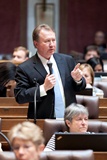
State Budget Update
June 12, 2015
|
Contact Me |

State Capitol
P.O. Box 8953
Madison, WI 53708
PH: (608) 266-0631
TF: (888) 534-0094
FAX: (608) 282-3694
District/Law Office
1230 Ferry Street
La Crosse, WI 54601
(608) 785-1886
rep.doyle@legis.wi.gov
On the Web:
http://doyle.assembly.wi.gov
|
In The District |
In The
Legislature
***
Assembly Committee on Financial Institutions - Ranking Member
Assembly Committee on Insurance
- Ranking Member
Assembly Committee on
Small Business Development
Joint Review Committee on
Criminal Penalties


So you may have
noticed that it has been quite a while since youíve heard from me about
the budget. When I last sent out an update, we knew that Joint Finance (JFC)
had delayed taking up some more controversial parts of the budget but we
didnít know when they would take it up again. So we waited and waited.
And weíre still waiting. Apparently, summer doldrums have hit the JFC
really hard.
All kidding aside, there is logic behind what is going on or rather not
going on right now. Transportation funding is one of the most
controversial issues currently facing the body and it is an issue that
doesnít break evenly along party lines. The majority party is currently
struggling to try to come up with a proposal that all of their members
support. So now is the perfect time for bipartisan compromise.
Unfortunately, there has been little to no effort to include the
minority party in the negotiations. I truly believe that is a mistake.
So where does that leave us? Well, the Legislative Fiscal Bureau, the
nonpartisan numbers people, and the Legislative Reference Bureau, the
nonpartisan bill drafters, are working to draft what was already passed
by JFC into an actual amendment to the bill. Once the JFC finishes its
work, the bill is expected to go to the Senate first where they will
perhaps make further changes. Then it will come to the Assembly for a
vote.
A note on the timeline: while the fiscal year ends on June 30, the new
budget does not have to be signed into law by then. Instead of a
government shutdown situation, all our state agencies would operate as
they do currently as they wait for the new budget to be signed into law.
What this means is that our state would be in a form of limbo: schools
that would face cuts once the budget passes are unable to plan for them
as the school year quickly approaches. Agencies and programs will not
know how much money they will have to operate. Some payments to agencies
and units of government may be delayed.
While we know that the goal is to have the budget passed and signed by
the end of this month, my colleagues and I are preparing ourselves for
the very real possibility that this budget process will extend as far as
July. The Chair of JFC has indicated that he hopes to hold its next
meeting on Wednesday. If that is an indication that they may wrap up
their work next week, the Senate could get the budget a week or so
later. I will be sure to keep you posted as we learn more information.
In the meantime, here is a recap of where we stand with the budget right
now based on the changes from JFC:
K-12 Education

-
The JFC maintained the Governorís proposed cuts of $127 million to public schools but added $70 million in the second year of the budget.
-
They lifted the 1,000 student enrollment cap on the statewide voucher program.
-
The JFC plan calls for private schools receiving vouchers to get roughly $7,200 for each K-8 student and $7,800 for each high school student. (This compares to $6635 per student that would go to a public school). This would cost $48 million over the next biennium.
-
The JFC motion would allow the DPI to grant teaching licenses to people wanting to teach technical courses and meet the requirements for work experience and teacher training. No bachelorís degree would be required.
Higher Education

-
The JFC approved a cut of $250 million to the UW System
The UW System would not be allowed to offset the cuts with the option they used in the past Ė tuition increases. Instead the JFC voted for a two year tuition freeze. -
Under the proposal, academic tenure would no longer be state law. Instead, the UW Board of Regents would have the option to keep tenure in place or not. Currently they are taking steps to keep it in place.
-
The system would now have the ability to grant merit pay.
-
The motion also moved the issue of shared governance to the Board of Regents, allowing them to decide if the current system of bringing students, faculty and instructors together for important decisions will remain.
HealthCare

-
The JFC approved the Governorís request for a waiver to allow DHS to contract with statewide managed care organizations to provide Family Care services.
-
They also voted not to maintain IRIS as an independent program but rather incorporate elements of the program into other programs.
-
The JFC voted to leave SeniorCare ďas is.Ē
Environment

-
The JFC voted to cut 80 positions from the DNR, including 18 out of 58 Bureau of Science Services positions.
-
The JFC voted to keep the Stewardship program intact but reduced their spending and borrowing limits
Jobs and Economic Development
-
The JFC voted not to approve the Governorís merger of WEDC with the Wisconsin Housing and Economic Development Authority (WHEDA).
Policy Items that snuck their way into the budget
-
Restrictions on how municipalities can use hotel taxes
-
Vouchers for special needs students
-
Lowered standards for teachers for grades 6-12
-
Civics tests for all high school graduates
-
Allowing homeschoolers to participate in public school sports
-
Limits on the influence Dane County has on their water quality plan
-
Removing county control over shore land zoning
-
Increasing logging in state forests

Needless to say, I have some significant concerns over many of the provisions of the budget, both as introduced and as amended by JFC. I have heard from many of my constituents about your specific concerns and, in fact, just received a petition signed by over 500 of you expressing opposition to many of the budget provisions relating to education. Whether there are things you like in the budget or things you donít like, it is important that I hear from you. Please let me know your thoughts before we take the final vote in the Assembly. After that, itís too late.
Sincerely,
STEVE DOYLE
State Representative
94th Assembly District
If you would like to have your name removed from this email list, please reply to this message with ďUnsubscribeĒ in the subject line